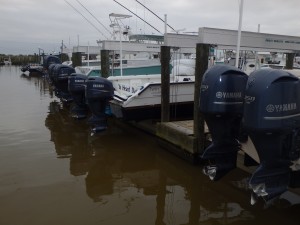
shiningly More Cajuns prefer Yamaha.
can you buy neurontin online I called the harbormaster in the morning, around six. He seemed gruff and not likely to be helpful. “Yeah theh’s boats goin’ out. Jes go ‘round and ask the captains if they’ll tek you.”
This was one of the problems – I felt – with calling ahead. When on a telephone, the stranger’s best guarantee of securing a favor would be possessing some kind of power – an institutional affiliation, for instance. If I had called saying I was from the New York Times, he might look to do something for me. But when you are arriving as yourself – which I was – it is useful to show a face before you ask for anything. And once they pass on the opportunity to do you a favor, it’s easy to not do anything at all. I might have been better off just showing up.
So I biked on down to the marina, though by the time I arrived it was around seven o’clock, after showering and breakfasting – I was afraid I might not have any particular opportunity to eat for quite awhile once I got on a boat.
The marina was full of boats, but empty of people. I wandered about looking at the names of boats, some of which were normal – named after women, it seemed – but others were distinctive to the area, like “We Dat,” and “Ya Heard Dat.” There was a little cafe there, but it was closed. I saw the harbormaster, who acknowledged me and then made it clear by puttering about that he had no time for me. I put my bike against a wall, took out a book, and waited. I asked the first shipowner I saw, but he said he wasn’t going out, he was just doing maintenance. Another said the same. I continued to sit there, and one hour became two. An older, gruff man showed up and hobbled his way toward a boat. I explained myself to him, and got a gruff response.
“Look now these here are company boats! These guys even if they wanted to they couldn’t take you anywhere, it’d be against the rules! Even if you paid ‘em they wouldn’t take you! Why don’t you go over to the commercial marina! There’s a bunch of shrimp fishermen there you’ll have a much better chance! Here you’re just wasting your time!”
This seemed to be the case, indeed. “Where’s the commercial marina?”
He looked at me like I was a waste of time myself. “Make a left, then another left.” And he turned around and hobbled off.
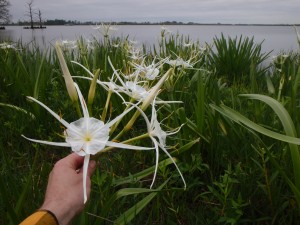
You can see the land around Venice is as much water as land. And that lily is Hymenocallis liriosme.
A left and then another left brought me to a long road – probably two miles long – with water on either side of it. There were some beautiful plants there – plants I had never seen in my life – and much garbage. Beer cans were a theme, and Bud Light in particular. To see an old twenty-four pack box in a stand of Hymenocallis liriosme was quite something. It wasn’t in the right place for a good picture, but I understand that a really good photographer would have posed the Bud Light somewhere perfect for the photograph. “Louisiana, land of Beauty and Bud Light.” In the distance was a large Chevron refinery, its towers looking Titans’ clarinets. There was a large la-z-boy chair next to a stand of some Louisiana irises, I felt that didn’t need any posing to make a good picture, so I snapped a shot of that.
At the end of the road was the Venice Marina. This was much larger than the Cypress Cove Marina, and instantly I saw that the old captain’s advice had been good. There was a little gift shop – where I asked to buy a pen (somehow I had forgotten a pen) and was given one, buying a postcard to reward their good behavior – and a restaurant (closed until lunchtime) and a fish-cleaning operation. At this latter place I found a large young man wearing a hoodie sweatshirt sitting on top of a picnic table playing with an iPhone. He didn’t quite look like anyone else I had seen before: I supposed he was Hispanic, and he had a thick Mexican build, but he was very dark-skinned and quite tall. I struck up a conversation, telling him what I was looking for. Yes, he said, boats came in here, I just had to wait. “One o’clock, they start to come in.” So I sat down next to him. There was absolutely nothing else going on.
He said he was from Honduras – “Ondura.” He had been living in the States six years; he liked it. He had first worked as a barber, in New Orleans. He wanted to go back to it. “But the place I worked, they chenge the rule, man. Before I used to rent my chair, right? Wa good money. There a lot of Spanish in New Orlean. But then she chenge the rules, she want fifty percent. That esound right to you? Fifty percent?”
“Sounds high.”
“Right? She not doin’ the work, man, she just rent the chair. So I go around New Orlean, but they all say ‘fifty percent.’ So I get yob here man, cleaning feesh. It good yob, eat feesh every day, breakfa lunch and dinner. Good yob. But we work, man, summer when the feesh come in, it a lot of work.”
He showed me around the few cleaning tables. “You wanna feesh man? You go out there and get some feesh?”
“No, not really my thing.”
“We can cheep them. Cheep them anywhere. We have vacuum seal, you put the feesh in there, it sealed good, we cheep them, New Jork, Cheecago, cheep all over.” He showed me the vacuum seal machine. “You can cheep it right to New Jork.” There was a row of about two dozen different types of knives all used for the fish cleaning. It was the kind of work generally called “honest,” which is to say, dirty, dirty and difficult. Everywhere in America the basic pattern prevailed: butchering fish all day was work that would be reserved for immigrants from Central America. Even way down here, the pattern was the same.
He told me about his church, which he said was a kind of African church; he mentioned the name, but I could not quite understand him. He was surprised I hadn’t heard of it. He went to New Orleans for this church. “It especial church, from Africa.” He pulled out his iPhone and showed me a video of it: several black women in African garb stood at the front of the church, singing. It looked like one of those services that was not likely to be over in an hour, or three hours, for that matter. While this video was rolling, he took the opportunity, oddly enough, to complain about iPhones and technology: “A few jeer ago, man, it not bad, now, everybody on the phone, nobody look at you no more, is weird, man, weird. They on game, they looking down at their phone. Is too much. I don’t like, something wrong.” As I said, this video was playing on his phone as he spoke, and so I had to divide my attention between the two.
He had a girlfriend in New Orleans. He wanted to marry her, but she was not willing. “She say men no good, men lie. She got hurt. I say women lie too, but not the good one. She good, though, she a good woman. She in my church.” I suspected the distance did not hurt his estimation of this woman’s excellence. He clearly missed her. “I wanna get married, but she say no. So what can I do.”
A boat came by, and Naim got up. He helped the boat fuel up – there was a gas pump at the dock. I spoke with the boat owner, who was not going out today. Really I had come too late in the morning – fishermen left early if at all. I wondered if I would not have to stay here a few days.
There was a bathroom upstairs by the gift shop. It was covered in graffiti, of the usual sort: “Phil Kent is a PUSSY.” “RUSTY LIKES DICK.” “Fred eats frog balls.” At the shop I asked for a recommended charter operators, and was given a list. “Do you have a recommendation?” “They’re all good,” the woman said. I decided to go through the list and call people. I would explain my situation and see if I could find someone to run me out relatively cheaply. But after speaking with four or five guys, and leaving messages for four or five more, I learned that most of the charter operators did not actually live in Venice: they came down from somewhere else specifically for jobs, and those jobs had to be lucrative enough to pay for their trip. The captains all recommended the same thing: “What you’re going to get is someone who’s already gone out that day, who’ll be willing to run you out quick after dropping off their customers. You’ll find someone. Someone will be willing to do it.”
So I was in the right place. I just needed patience.
I came down and saw Naim. “One o’clock,” he repeated. “Boats start coming in one o’clock.”
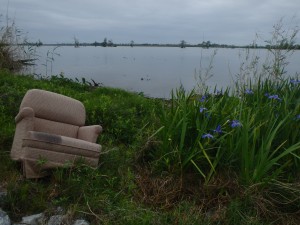
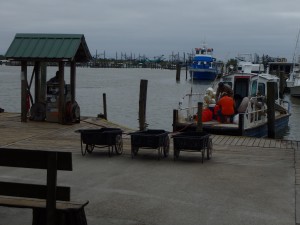
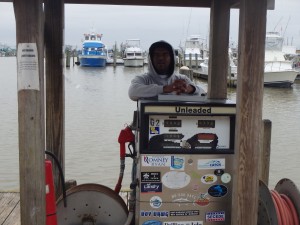
Post a Comment